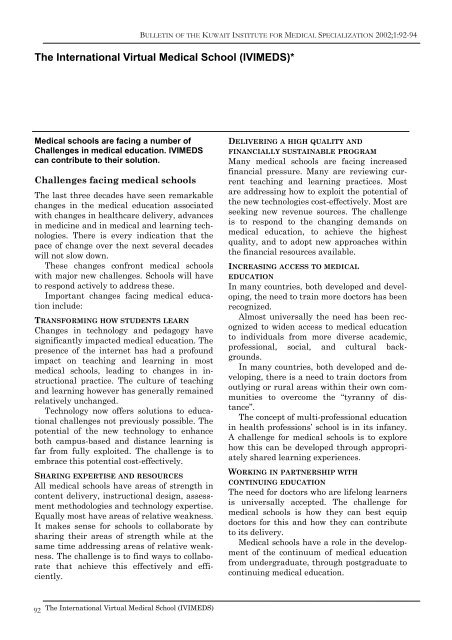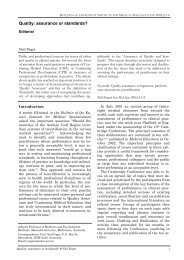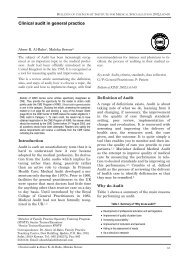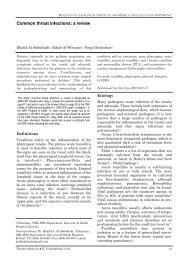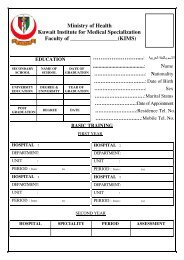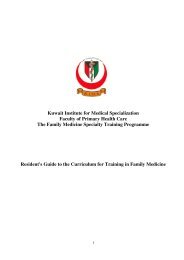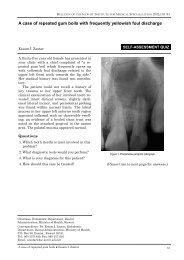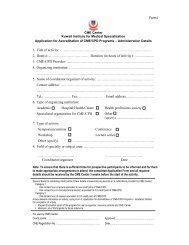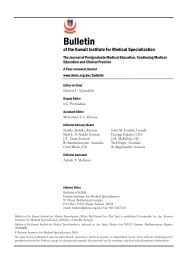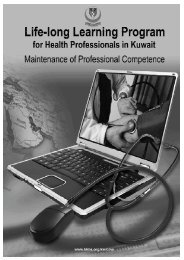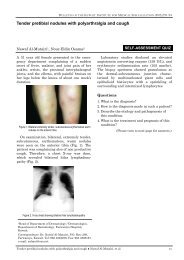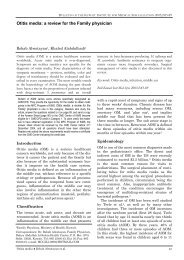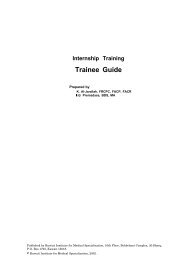The International Virtual Medical School (IVIMEDS)* - KIMS
The International Virtual Medical School (IVIMEDS)* - KIMS
The International Virtual Medical School (IVIMEDS)* - KIMS
Create successful ePaper yourself
Turn your PDF publications into a flip-book with our unique Google optimized e-Paper software.
BULLETIN OF THE KUWAIT INSTITUTE FOR MEDICAL SPECIALIZATION 2002;1:92-94<br />
<strong>The</strong> <strong>International</strong> <strong>Virtual</strong> <strong>Medical</strong> <strong>School</strong> (<strong>IVIMEDS</strong>)*<br />
<strong>Medical</strong> schools are facing a number of<br />
Challenges in medical education. <strong>IVIMEDS</strong><br />
can contribute to their solution.<br />
Challenges facing medical schools<br />
<strong>The</strong> last three decades have seen remarkable<br />
changes in the medical education associated<br />
with changes in healthcare delivery, advances<br />
in medicine and in medical and learning technologies.<br />
<strong>The</strong>re is every indication that the<br />
pace of change over the next several decades<br />
will not slow down.<br />
<strong>The</strong>se changes confront medical schools<br />
with major new challenges. <strong>School</strong>s will have<br />
to respond actively to address these.<br />
Important changes facing medical education<br />
include:<br />
TRANSFORMING HOW STUDENTS LEARN<br />
Changes in technology and pedagogy have<br />
significantly impacted medical education. <strong>The</strong><br />
presence of the internet has had a profound<br />
impact on teaching and learning in most<br />
medical schools, leading to changes in instructional<br />
practice. <strong>The</strong> culture of teaching<br />
and learning however has generally remained<br />
relatively unchanged.<br />
Technology now offers solutions to educational<br />
challenges not previously possible. <strong>The</strong><br />
potential of the new technology to enhance<br />
both campus-based and distance learning is<br />
far from fully exploited. <strong>The</strong> challenge is to<br />
embrace this potential cost-effectively.<br />
SHARING EXPERTISE AND RESOURCES<br />
All medical schools have areas of strength in<br />
content delivery, instructional design, assessment<br />
methodologies and technology expertise.<br />
Equally most have areas of relative weakness.<br />
It makes sense for schools to collaborate by<br />
sharing their areas of strength while at the<br />
same time addressing areas of relative weakness.<br />
<strong>The</strong> challenge is to find ways to collaborate<br />
that achieve this effectively and efficiently.<br />
DELIVERING A HIGH QUALITY AND<br />
FINANCIALLY SUSTAINABLE PROGRAM<br />
Many medical schools are facing increased<br />
financial pressure. Many are reviewing current<br />
teaching and learning practices. Most<br />
are addressing how to exploit the potential of<br />
the new technologies cost-effectively. Most are<br />
seeking new revenue sources. <strong>The</strong> challenge<br />
is to respond to the changing demands on<br />
medical education, to achieve the highest<br />
quality, and to adopt new approaches within<br />
the financial resources available.<br />
INCREASING ACCESS TO MEDICAL<br />
EDUCATION<br />
In many countries, both developed and developing,<br />
the need to train more doctors has been<br />
recognized.<br />
Almost universally the need has been recognized<br />
to widen access to medical education<br />
to individuals from more diverse academic,<br />
professional, social, and cultural backgrounds.<br />
In many countries, both developed and developing,<br />
there is a need to train doctors from<br />
outlying or rural areas within their own communities<br />
to overcome the “tyranny of distance”.<br />
<strong>The</strong> concept of multi-professional education<br />
in health professions’ school is in its infancy.<br />
A challenge for medical schools is to explore<br />
how this can be developed through appropriately<br />
shared learning experiences.<br />
WORKING IN PARTNERSHIP WITH<br />
CONTINUING EDUCATION<br />
<strong>The</strong> need for doctors who are lifelong learners<br />
is universally accepted. <strong>The</strong> challenge for<br />
medical schools is how they can best equip<br />
doctors for this and how they can contribute<br />
to its delivery.<br />
<strong>Medical</strong> schools have a role in the development<br />
of the continuum of medical education<br />
from undergraduate, through postgraduate to<br />
continuing medical education.<br />
92<br />
<strong>The</strong> <strong>International</strong> <strong>Virtual</strong> <strong>Medical</strong> <strong>School</strong> (<strong>IVIMEDS</strong>)
BULLETIN OF THE KUWAIT INSTITUTE FOR MEDICAL SPECIALIZATION 2002;1:92-94<br />
PROVIDING LEADERSHIP IN MEDICAL<br />
EDUCATION<br />
<strong>Medical</strong> schools have an important leadership<br />
role to play in steering and directing changes<br />
in medical education relating to curriculum<br />
delivery, educational strategies, instructional<br />
design, teaching and learning methods, assessment,<br />
globalization and international<br />
standard setting.<br />
<strong>The</strong> <strong>IVIMEDS</strong> collaboration<br />
THE AIMS OF <strong>IVIMEDS</strong><br />
<strong>The</strong> <strong>International</strong> <strong>Virtual</strong> <strong>Medical</strong> <strong>School</strong><br />
(<strong>IVIMEDS</strong>) is a unique collaboration among<br />
leading edge medical schools and institutions<br />
world-wide committed to achieving maximum<br />
benefit from new educational technologies.<br />
<strong>IVIMEDS</strong>, working where appropriate with<br />
other professions, aims to play a part in improving<br />
health and tackling human disease<br />
worldwide by providing a blend of e-learning<br />
and high quality face-to-face learning for<br />
medical professionals.<br />
DEVELOPING THE CONCEPT<br />
Over the past year, a study of the <strong>IVIMEDS</strong><br />
concept has been undertaken, funded by the<br />
Scottish Higher Education Funding Council,<br />
Scottish Enterprise, Scottish knowledge and<br />
NHS Education for Scotland. Discussions<br />
were held with 52 collaborating medical<br />
schools and institutions from 16 countries.<br />
One hundred and eight representatives met<br />
in St. Andrews from the 12 th - 14 th June 2002,<br />
to review the proposal.<br />
<strong>The</strong> June meeting was the culmination of<br />
Stage 1 of a three-stage development of<br />
<strong>IVIMEDS</strong>. Stage 2 is a full feasibility study<br />
and proof of concept for <strong>IVIMEDS</strong> that will<br />
take a year to complete. Stage 3 would be the<br />
full implementation of the business plan developed<br />
during Stage 2.<br />
<strong>The</strong> <strong>IVIMEDS</strong> concept was endorsed at the<br />
June meeting and it was concluded that medical<br />
schools and institutions should be invited<br />
to participate in Stage 2 of the development.<br />
FEATURES OF <strong>IVIMEDS</strong><br />
<strong>IVIMEDS</strong> will include:<br />
• A bank of shareable learning resource materials<br />
in the form of reusable learning objects<br />
(RLOs). RLOs are small discrete<br />
chunks of learning that are metatagged<br />
(indexed) and stored in a database. Interna-<br />
tional standards for metatagging will be<br />
used to insure maximum interoperability.<br />
<strong>The</strong> RLOs may be pieces of text, short video<br />
clips, annotated diagrams, simulated problems<br />
or questions. <strong>The</strong>y can be used in a<br />
wide range of learning situations in different<br />
instructional contexts.<br />
• Curriculum maps that assist students and<br />
instructors to exchange information about<br />
what is being taught and when it is taught.<br />
<strong>The</strong>y help to ensure that the curriculum<br />
reflects the overall goals of the individual<br />
partner schools.<br />
• Student study guides in the form of personal<br />
learning plans that will help the student<br />
follow their optimal path through the<br />
curriculum. <strong>The</strong> study guides may vary depending<br />
on a student’s background, prior<br />
experience, learning style and plan for completing<br />
the curriculum<br />
• Appropriate face-to-face learning experiences<br />
blended with the e-learning opportunities<br />
and provided in a partner school, in<br />
the community or elsewhere.<br />
• Student support provided through face-toface<br />
and/or online faculty mentors, student<br />
study guides and peer-to-peer collaborative<br />
learning experiences using software developed<br />
for the purpose.<br />
• State of art assessment methods that serve<br />
both a formative and summative role in the<br />
evaluation of students. Assessments will<br />
reflect the learning outcomes agreed by<br />
partner schools and will be developed in<br />
collaboration with partner schools and with<br />
national testing bodies.<br />
• Development and maintenance of quality.<br />
<strong>The</strong> <strong>IVIMEDS</strong> program will be structured<br />
to take full account of international academic<br />
and technology standards. It will embrace<br />
appropriate quality assurance measures<br />
and best evidence medical education.<br />
DEVELOPMENT OF <strong>IVIMEDS</strong><br />
<strong>IVIMEDS</strong> will have a clear development trajectory<br />
by:<br />
• Providing, at an early stage, a shared bank<br />
of resources including RLOs, curriculum<br />
maps, student study guides, assessment<br />
methods, and an effective user management<br />
system.<br />
• Enable students in collaborating schools to<br />
use elements of the <strong>IVIMEDS</strong> curriculum<br />
in the first 2-3 years of their medical<br />
<strong>The</strong> <strong>International</strong> <strong>Virtual</strong> <strong>Medical</strong> <strong>School</strong> (<strong>IVIMEDS</strong>)<br />
93
BULLETIN OF THE KUWAIT INSTITUTE FOR MEDICAL SPECIALIZATION 2002;1:92-94<br />
course. <strong>IVIMEDS</strong> students successfully<br />
completing their studies will be acceptable<br />
in principle for entry to the later years of<br />
the school’s program.<br />
• Providing a comprehensive <strong>IVIMEDS</strong><br />
blended curriculum, embracing a range of<br />
pedagogic methodologies, covering the<br />
whole of the undergraduate medical education<br />
course.<br />
• Extending the concept of <strong>IVIMEDS</strong> to postgraduate<br />
and continuing education, and<br />
education and training in other health professions.<br />
<strong>IVIMEDS</strong> will develop steadily<br />
but purposefully to an agreed timetable<br />
with clear targets and milestones, guided<br />
by the participating medical schools.<br />
Stage 2 is a full feasibility study and proof<br />
of concept, running from September 2002 until<br />
September, 2003. <strong>The</strong> following activities<br />
will be undertaken:<br />
• Development of an agreed academic strategy<br />
• Conduct of a detailed market analysis<br />
• Preparation of a fully costed (financially<br />
accountable) business plan<br />
• Submission of clear long term funding proposals<br />
• Development of the resource bank including<br />
pilot studies undertaken to further<br />
proof of concept for the <strong>IVIMEDS</strong> instructional<br />
approach.<br />
• Identification of a recommended user management<br />
system<br />
• Development of institutional guidelines on<br />
staff development and training.<br />
Stage 3 would be the full development and<br />
implementation stage during which the business<br />
plan would be implemented. Current<br />
thinking, to be reviewed in stage 2, is that<br />
Stage 3 will be completed and <strong>IVIMEDS</strong> operational<br />
by September 2004. <strong>The</strong> Steering<br />
Council formed to oversee Stage 2 work will<br />
determine the precise Stage 3 activities.<br />
OPERATION OF <strong>IVIMEDS</strong><br />
<strong>IVIMEDS</strong> will be incorporated as a not-forprofit<br />
partnership company. Income will be<br />
generated by participating medical schools<br />
form several revenue streams. <strong>The</strong>se will include<br />
the sale by <strong>IVIMEDS</strong> to third parties of<br />
learning and curriculum resources, sales to<br />
health systems and third party medical education<br />
institutions of structured learning programs<br />
relevant for undergraduate, postgraduate<br />
and continuing medical education, and<br />
incremental medical student fees.<br />
An <strong>IVIMEDS</strong> Foundation will be established<br />
to support the education, training, and<br />
development of health professional in developing<br />
countries.<br />
<strong>IVIMEDS</strong> will be governed, during Stage 2,<br />
by a Steering Council whose membership will<br />
consist of representatives of the schools that<br />
elect to participate in Stage 2. <strong>The</strong> Steering<br />
Council will be responsible for developing and<br />
approving the academic strategy and business<br />
plans for <strong>IVIMEDS</strong>.<br />
An Executive Team will be appointed to<br />
undertake Stage 2. It is proposed that it consist<br />
of a Project Director, and Business Development<br />
Director. <strong>The</strong>y will be responsible for<br />
implementing Stage 2 terms of reference (to<br />
be agreed in detail by the Steering Council)<br />
and establishing the “proof of concept”<br />
through pilot studies and field testing.<br />
Project groups of experts in the areas of<br />
assessment, student support systems, resource<br />
bank and user management systems,<br />
and staff training and development will be<br />
established drawing on the expertise in participating<br />
schools.<br />
For further information contact:<br />
Professor Ronald Harden<br />
Center for <strong>Medical</strong> Education<br />
Tay Park House<br />
484 Perth Road, Dundee<br />
DD2 1LR, Scotland, UK<br />
Email: ivimeds@dundee.ac.uk<br />
www.ivimeds.org<br />
* <strong>The</strong> text is an extract from material distributed by the author.<br />
94 <strong>The</strong> <strong>International</strong> <strong>Virtual</strong> <strong>Medical</strong> <strong>School</strong> (<strong>IVIMEDS</strong>)


